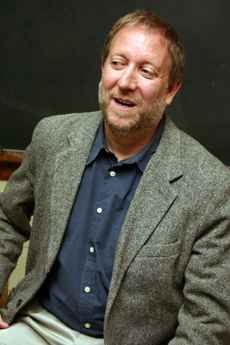Jewish journalist speaks to campus about Israeli-Palestinian coverage

Yossi Klein Halevi, Israel correspondent for the New Republic, gives a speech titled, “Media Coverage of the Israeli-Palestinian Conflict” in Gregory Hall on Wednesday. His talk was a part of Halevi´s 11-day stay at the University, in which he spok Regina Martinez
November 3, 2005
University students, faculty and community members gathered Wednesday afternoon in Gregory Hall to hear Yossi Klein Halevi speak on “Media Coverage of the Israeli-Palestinian Conflict.”
Halevi is the Israel correspondent for the New Republic, the author of “At the Entrance to the Garden of Eden: A Jew’s Search for God with Christians and Muslims in the Holy Land” and “Memoirs of a Jewish Extremist: An American Story,” a regular commentator on Israeli affairs for the Los Angeles Times, the New York Times and the Washington Post and a journalist for the Jerusalem Post. Halevi grew up in New York and received his master’s degree in journalism from Northwestern University’s Medill School of Journalism.
“There is no conflict on the face of the earth … more subject to more systematic scrutiny than the Arab-Israeli war,” Halevi said in his opening statements.
He added that there are more journalists concentrated in Jerusalem than in most of the other major cities.
“Not surprisingly, media coverage has become a factor – I would even say a strategic factor in how each side calculates its actions,” Halevi said.
Get The Daily Illini in your inbox!
Halevi addressed the ethical issues facing the press covering the conflict and the media’s role.
“The problem is that what has happened to many journalists … is a shift that has been made from a journalistic quest for truth at the ethical basis of the profession to a shift toward a quest for justice,” Halevi said.
Advocacy journalism is ethical, provided the author and the media organization make it clear that it is biased. The problem is when a journalist presents himself as objective, when they are not. The New Republic is known for being a pro-Israel media outlet, Halevi said.
Throughout the lecture, Halevi spoke of several issues within the Arab-Israeli conflict, saying that not everyone would agree with his views and interpretations.
Interpretations of the events in the Middle East all depend on perspective, and that is the problem with being a journalist who pretends to be objective while holding other motives, Halevi said.
“I think this topic is very relevant, and I think the media coverage right now is not enough,” said Keren Krizhak, staff member at the Hillel Foundation. “I think if he had more time, it would have been better.”
Halevi is the University’s Program in Jewish Culture and Society’s first Writer in Residence, a new initiative this fall.
He arrived on campus on Oct. 23. In his time here, he has addressed topics ranging from the lives of Israeli women and children, co-sponsored by the Women’s and Gender Studies Program, to religion as a possible source for reconciliation of the Israeli-Palestinian conflict, co-sponsored by the Program in Middle Eastern Studies.
Halevi will give his final lecture on Thursday at the Sinai Temple at 8 p.m. He will present a lecture entitled “A Religious Jew’s Journey into Christianity and Islam.”
The Program in Jewish Culture and Society began in 1997 and was designed to promote and support the academic study of Jewish culture and society. The program offers over 30 courses in Jewish culture and society in several departments at the University.
“The University is trying very hard to be global in its coverage, and certainly Israel and the Middle East are regions which need to be understood,” said Michael Shapiro, director of the program.
The program plans on continuing the initiative. It will host another writer in residence this spring and next fall.
“(Halevi) is somebody who is able to explain what is happening in Israel to an American public,” said Shapiro. “He is also somebody who made a conscious effort to understand his Muslim and Christian neighbors, and, as a result, he not only understands Israeli society, but has a sense of other religious communities that are there.”






